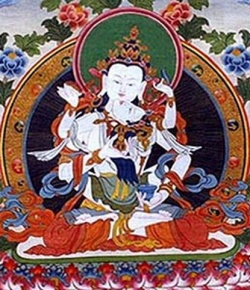Difference between revisions of "The Hundred-Syllable Mantra of Vajrasattva"
| (One intermediate revision by the same user not shown) | |||
| Line 8: | Line 8: | ||
-[[Dilgo Khyentse Rinpoche]] | -[[Dilgo Khyentse Rinpoche]] | ||
| − | [[Vajrasattva’s | + | [[Vajrasattva’s mantra]] is a powerful [[purification]] [[prayer]] that invokes the [[mindstreams]] of all the [[Buddhas]]. [[Khenpo Sherab Sangpo]] suggests that his students recite this [[mantra]] 21 times or more each day. |
| + | |||
| + | |||
[[Sanskrit]]: | [[Sanskrit]]: | ||
| + | |||
[[oṃ]] [[vajrasattva]] samayam anupālaya [[vajrasattva]] tvenopatiṣṭha dṛḍho me [[bhava]] sutoṣyo me [[bhava]] | [[oṃ]] [[vajrasattva]] samayam anupālaya [[vajrasattva]] tvenopatiṣṭha dṛḍho me [[bhava]] sutoṣyo me [[bhava]] | ||
supoṣyo me [[bhava]] anurakto me [[bhava]] sarvasiddhiṃ me prayaccha sarvakarmasu ca me cittaṃ śreyaḥ [[kuru]] [[hūṃ]] ha ha ha ha hoḥ [[bhagavan]] sarvatathāgatavajra mā me muñca [[vajrī]] [[bhava]] mahāsamayasattva āḥ | supoṣyo me [[bhava]] anurakto me [[bhava]] sarvasiddhiṃ me prayaccha sarvakarmasu ca me cittaṃ śreyaḥ [[kuru]] [[hūṃ]] ha ha ha ha hoḥ [[bhagavan]] sarvatathāgatavajra mā me muñca [[vajrī]] [[bhava]] mahāsamayasattva āḥ | ||
| + | |||
| + | |||
English: | English: | ||
| − | [[Oṃ]]. [[Vajrasattva]], keep your [[samaya]]. As [[Vajrasattva]], remain near me. Be steadfast towards me. Be very [[pleased]] with me. Be completely satisfied with me. Be [[loving]] to me. Grant me all accomplishments. | + | [[Oṃ]]. [[Vajrasattva]], keep your [[samaya]]. |
| + | |||
| + | As [[Vajrasattva]], remain near me. | ||
| + | |||
| + | Be steadfast towards me. Be very [[pleased]] with me. | ||
| + | |||
| + | Be completely satisfied with me. | ||
| + | |||
| + | Be [[loving]] to me. Grant me all accomplishments. | ||
| + | |||
| + | In all [[actions]], make me [[mind]] [[pure]] and [[virtuous]]. | ||
| + | |||
| + | [[Hūṃ]]. Ha ha ha ha hoḥ. O [[Blessed One]], [[Vajra]]-[[nature]] of all the [[Tathāgatas]], do not abandon me. | ||
| + | |||
| + | Be of [[vajra-nature]], O great [[Samaya-being]], āḥ. | ||
| − | |||
| + | Whatever [[manifestations]] of [[realms]], {{Wiki|palaces}} and [[forms]] there are, [[peaceful and wrathful deities]], they do not [[exist]] on a gross level. | ||
| − | + | They are [[forms]] of [[shunyata]] endowed with all the supreme qualities. | |
Therefore, they are known as possessing the aspect of being without [[self-nature]]. | Therefore, they are known as possessing the aspect of being without [[self-nature]]. | ||
Latest revision as of 07:27, 9 November 2015
To meditate on Vajrasattva is the same as to meditate upon all the Buddhas. His hundred-syllable mantra is the quintessence of all mantras.
-Dilgo Khyentse Rinpoche
Vajrasattva’s mantra is a powerful purification prayer that invokes the mindstreams of all the Buddhas. Khenpo Sherab Sangpo suggests that his students recite this mantra 21 times or more each day.
Sanskrit:
oṃ vajrasattva samayam anupālaya vajrasattva tvenopatiṣṭha dṛḍho me bhava sutoṣyo me bhava
supoṣyo me bhava anurakto me bhava sarvasiddhiṃ me prayaccha sarvakarmasu ca me cittaṃ śreyaḥ kuru hūṃ ha ha ha ha hoḥ bhagavan sarvatathāgatavajra mā me muñca vajrī bhava mahāsamayasattva āḥ
English:
Oṃ. Vajrasattva, keep your samaya.
As Vajrasattva, remain near me.
Be steadfast towards me. Be very pleased with me.
Be completely satisfied with me.
Be loving to me. Grant me all accomplishments.
In all actions, make me mind pure and virtuous.
Hūṃ. Ha ha ha ha hoḥ. O Blessed One, Vajra-nature of all the Tathāgatas, do not abandon me.
Be of vajra-nature, O great Samaya-being, āḥ.
Whatever manifestations of realms, palaces and forms there are, peaceful and wrathful deities, they do not exist on a gross level.
They are forms of shunyata endowed with all the supreme qualities.
Therefore, they are known as possessing the aspect of being without self-nature.
The minds of those buddhas are completely filled with the wisdom of unchanging non-dual bliss emptiness.
Therefore, they are known as possessing the aspect of union.
Their body, speech, and mind are eternally filled with the taste of great bliss, free from increase and decrease. Therefore, they are known as possessing the aspect of great bliss.
-Dilgo Khyentse Rinpoche
